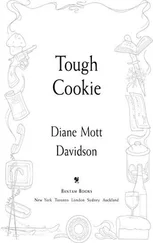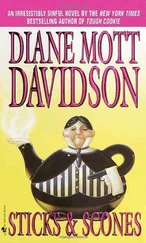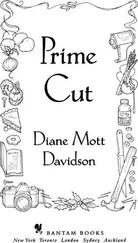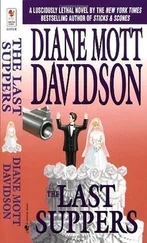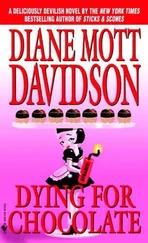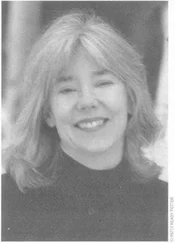“Oh, really? Are you going to do a story on how the Prince & Grogan head of security was found dead this afternoon?”
This had the desired effect. Frances’s body jerked. The cigarette dropped from her fingers.
“Nicholas Gentileschi?” John Routt said. “Dead?”
“Yes. Did you know him?”
John Routt was shaking his head. “No. No, I did not.”
I said, “Well, then—”
His shoulders slumped. There was an uncomfortable silence. “You see, Mrs. Schulz,” he said finally. “I was doing something for Frances and she was doing something for me.”
“And what was that? I’m sorry, but this does affect our family … you see, my helper, Julian Teller, lost a dear friend—”
“I know,” said John Routt. He absentmindedly patted his wrinkled pants. “Oh, Mrs. Schulz, the reason I hired Frances is that Nicholas Gentileschi suspected my granddaughter of theft. I’m sorry to hear he died, but I’m not surprised, with the people we’re dealing with. Frances and I were trying to clear Dusty. That’s why we needed the receipt. That’s why Frances was asking you for it. Does that make sense? Dusty was being accused of not giving receipts, but our suspicion was that the whole place has a receipt problem.”
“I’m sorry, I don’t understand. I don’t know what happened to the receipt. I saw it, but then Nick Gentileschi’s body … the receipt is probably back at the store. And I still don’t understand why you would need it.”
John Routt said, “There has been some theft at the store. I was afraid Gentileschi suspected I was behind the thievery. You see, what you may not know is that I have a history with Foucault-Reiser Cosmetics.”
I was suddenly aware of how much work I had to do before deadline time for the Braithwaites’ party. What John Routt was saying confused me. Outside, raindrops began to fall.
I said, “What history? What theft?”
He invited me to sit down. When the three of us were settled in the sparsely decorated room, he smiled wryly. “Mrs. Schulz, did your husband serve in Vietnam?”
Taken off guard, I said, “Well, yes, as a matter of fact. That was before I knew him, though.”
“And he came back and became a policeman,” Mr. Routt said.
“He … finished his degree first, I think. Then he went into law enforcement.”
Frances grunted, but John Routt held up an age-spotted hand. “When I got back from Korea in ’fifty-four, I was twenty-one. I tried to get into the police academy in—”
“Don’t, John,” Frances interrupted sharply. “Don’t tell her where. No specifics. She doesn’t need to know, for crying out loud! Goldy, I’m still trying to salvage a story here. If you don’t mind, I’d like to keep you and your investigator husband out of this until it’s published. Please at least let me do that.”
John Routt shook his head. He continued, “… tried to get into the police academy … in the small town I was from. But there weren’t any openings. No openings. There or anywhere else.” He paused for a long time, his eyes closed. When he opened them he clucked his tongue. “Did you ever feel utterly worthless, Mrs. Schulz? As if everything that went wrong in your life Was your fault?”
“Yes,” I said evenly, “I have felt that way. For seven years, as a matter of fact.”
“And what did you do to change things?” he asked. His watery eyes blinked as he waited for my answer.
“I got a divorce and started a catering business.”
Again John Routt clucked. “I should have done that! My goodness. Actually, I didn’t want a divorce, I just wanted a job. But there weren’t any jobs.” He sighed. “So I robbed a bank. More accurately, I drove the getaway car for a couple of buddies of mine.”
The bank job. Tom had mentioned a famous bank robbery involving a man named Routt. His memory had been correct. Our neighbor was the same Routt. No wonder Sally Routt had told Dusty she was afraid of what the church helping to build their house might find out. “So if you were driving a getaway car, you … must have been able to—” I began. Frances groaned.
“Yes,” John Routt said softly. “I had my vision then. But I got caught and convicted for armed robbery. Eventually I ended up at the state penitentiary in—”
“John!” Frances interjected.
“I went to a state penitentiary,” John Routt continued. “I was young,” he said. “I was married. And so, Mrs. Schulz, when I was promised points in the time-off-for-good-behavior program, I took it.” For the first time, his voice wavered. His head drooped forward. Frances and I sat very still as John Routt collected himself. “Catch was,” he went on, “to get my time off, I had to volunteer for cosmetics testing from a company called Foucault-Reiser.” He let out a self-deprecating cackle. “And here I am! The chemical the company used on me caused an infection in one eye. It spread to the other eye as quick as you could imagine. They don’t use that chemical in cosmetics, thank the Lord. Because of me! I’m the reason your eyes don’t burn when you smear your mascara.”
“God help us,” I said softly, appalled. I remembered Frances’s cryptic answer to my demand to know what she was up to: Did you ever hear of Ray Charles?
Frances stood up. “John, you don’t have to tell her all this. We’ll get Mignon, one way or another. It is going to happen.”
“Let me finish telling Mrs. Schulz what I’m going to tell her, will you, Frances? Please?”
She flopped back in her chair and rooted around for a cigarette.
John Routt shook his head and gestured with his large, trembling hands. Overhead, the rain beat down harder. “The warden was being paid by Foucault-Reiser, and he said if I told what had happened when their chemical ruined my eyes, I’d never get out of that place. Foucault-Reiser gave me some money, and I was released early. And before you ask, no, I didn’t sue.” When he shook his head, some strands of white hair came loose again. He patted them back into place. “Nobody but rich folks sued back then. I learned to play the saxophone. My wife, Jaylene, supported us by being a nurse. But when Jaylene died last year, I came to live with my daughter. Sally’s had a hard life … connected up with two men who wouldn’t marry her … well. Anyway, Sally’s the one, Dusty’s mother, that is, who read me the article Frances did on the high cost of cosmetics. That’s why Frances is here. I called her. I told her I might have a big story for her newspaper.” He chuckled. “She was doing it all for me, trying to get justice, trying to get a big story.” His voice turned serious. “I didn’t want my granddaughter to know. God only knows why she took a job with that same company. She knew what happened to me, but … I guess it’s like the children of race car drivers, wanting to get involved in the same thing….” He cackled sarcastically. “They must pay well. They’ve always paid well. But no matter what, I didn’t want to get Dusty involved.”
I could hear Dusty’s voice as she applied eyeshadow to my lids: Don’t open your eyes! You don’t know what could happen! God only knew why she’d taken the job, indeed. I wondered where Dusty was.
Frances said, “John—”
“Frances, don’t keep on. Mrs. Schulz?”
“Please call me Goldy.”
“I just want to finish telling you, since you wanted to know why Frances was here. Last month, just after Frances and I started working together, Dusty told us they were targeting her for employee theft.” He shook his head. “I thought, oh my Lord! They must know—Mignon, the parent company, Foucault-Reiser—someone must know I’m trying to get back at them! So they’re targeting my granddaughter! They’re trying to frame her with employee theft!”
Читать дальше



